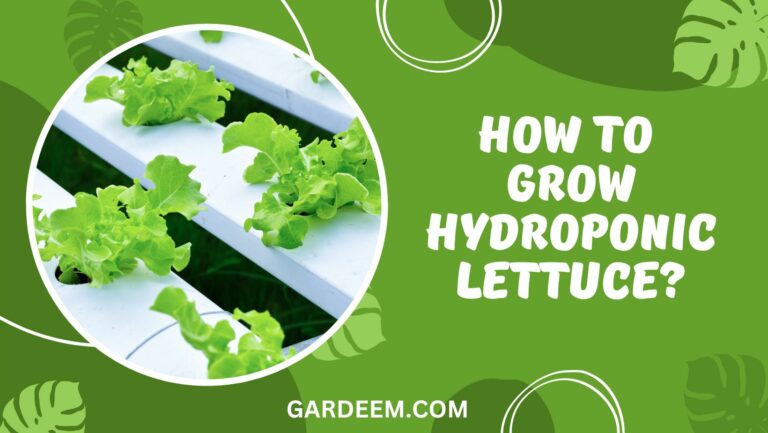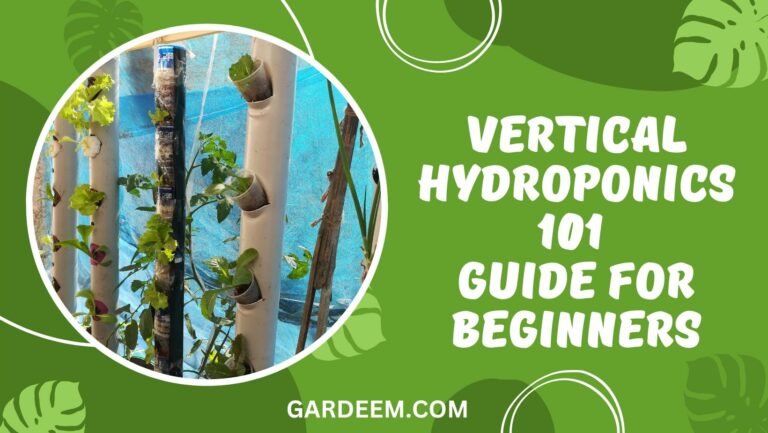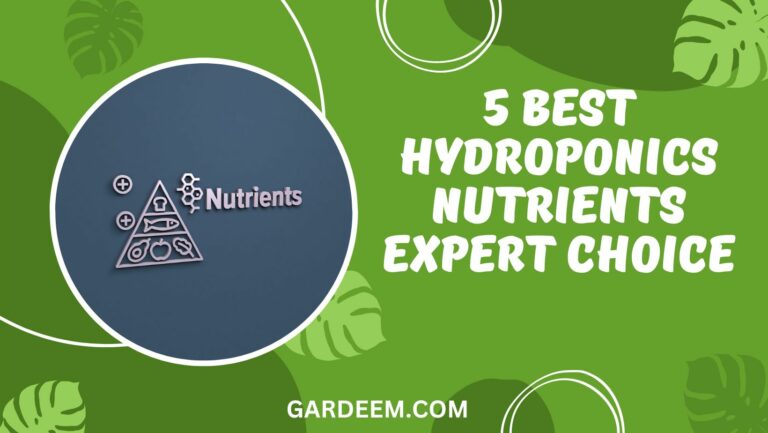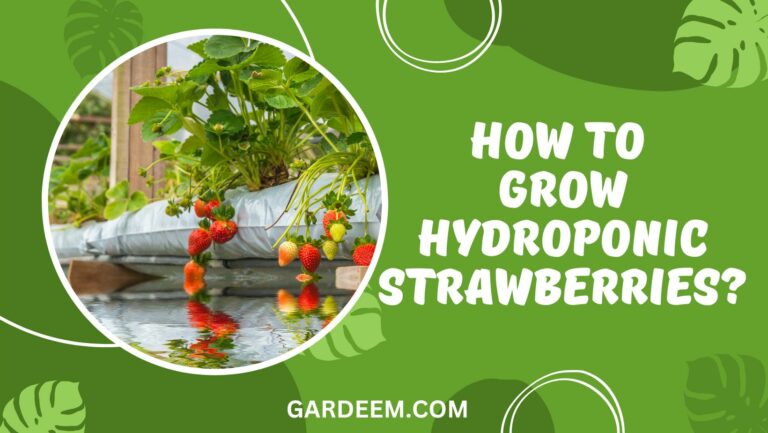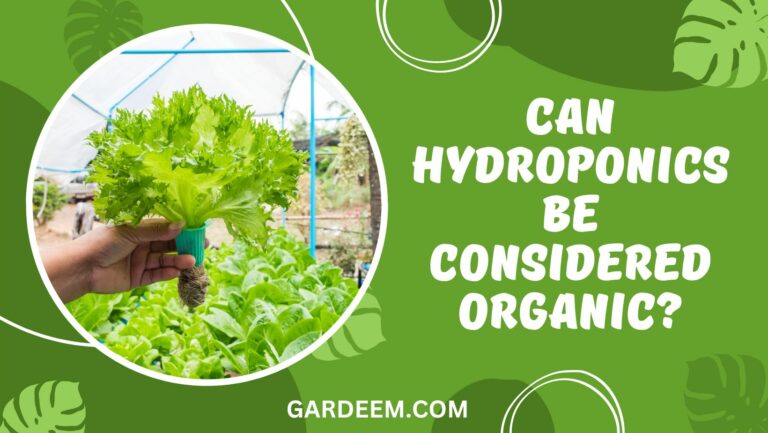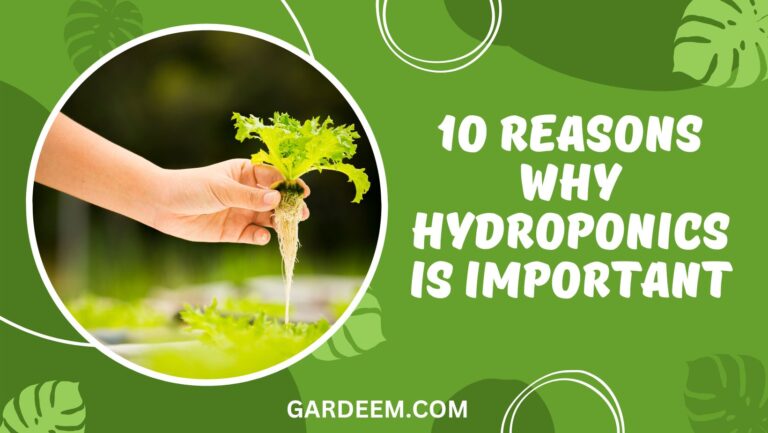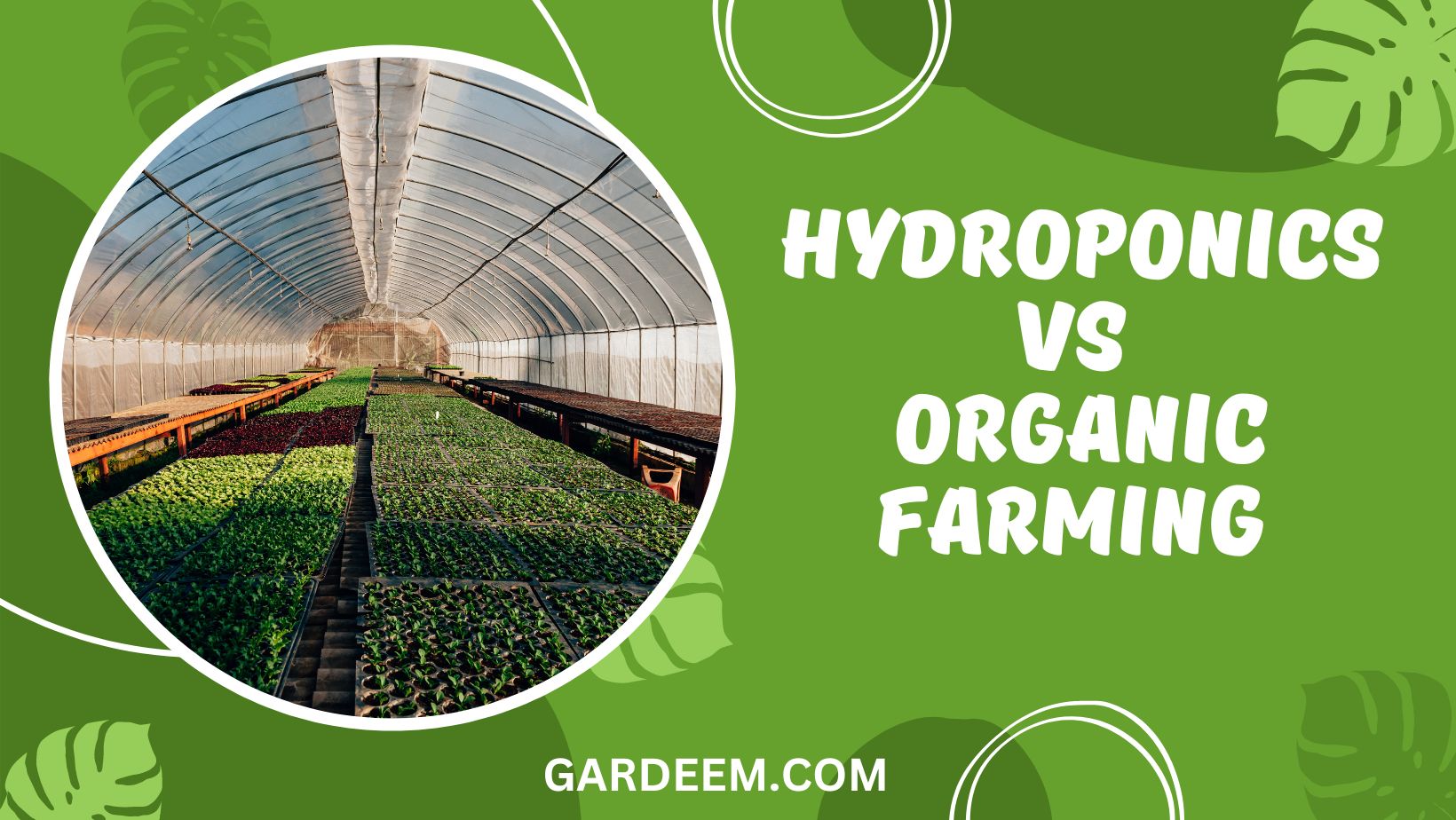
We’ve written previously about if hydroponics can be considered organic and looked at if hydroponics can feed the world.
In this post, we’re taking a look at hydroponics vs organic farming to see which has the most potential for food production and land management.
In the realm of modern agriculture, two distinct methods have gained significant attention: hydroponics and organic farming. Both approaches offer unique advantages and challenges. Hydroponics relies on water-based nutrient solutions to cultivate plants, while organic farming focuses on natural and sustainable practices. This article aims to provide a comprehensive comparison of hydroponics and organic farming, shedding light on their benefits, limitations, and environmental impact.
Hydroponics vs Organic Farming
What is hydroponics? Hydroponics refers to the growing of plants in the absence of soil. The plants are grown in an inert medium such as gravel, and rocks and are provided with a mix of primary, secondary, and micro-nutrients.
The need for soil and its micro-organics has been completely eliminated by hydroponic growers. Almost any type of crop can be grown hydroponically, such as vegetables, fruits, and flowers.
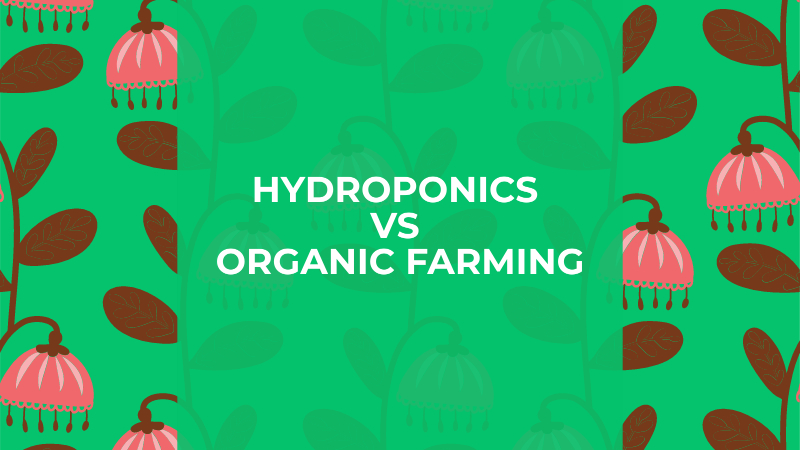
What is organic farming?
Organic farming involves growing and nurturing crops with the use of biological fertilizers that are derived from animal and plant waste, ecologically based pest controls and without the use of chemical-based fertilizers, pesticides, and genetically modified organisms.
With the growing population that they consume, the world has taken a turn bout the importance of healthy living. They have also taken an interest in what they consume and intake in their bodies. The increasing number that has been heard debating on crop growing and food safety has never been this big.
The principle goal of organic farming is to ensure vital qualities and organic integrity at all stages of crop production (source).
7 Advantages of hydroponics
The advantages of hydroponics include the following:
Efficient use of water – hydroponics is much more water-efficient in contrast to traditional growing methods.
Controlled environment –The growing of plants is in a more climate. This allows the farmers to use the amount of water required for the plants without any waste.
The yields are higher – the plants are cultivated in a climate-controlled environment hence the farmers are not limited by adverse weather conditions which results in higher crop returns. Due to the controlled environment, the plants are not limited to a specific growing season.
Reduced labor & Fewer chemicals– hard tasks such as tilling and cultivating are not needed for hydroponics. since plants are grown in a controlled environment, there is reduced pest pressure.
Efficient resource utilization: Hydroponics systems can use up to 90% less water compared to conventional farming. Nutrients are supplied directly to the plants, minimizing wastage and reducing water consumption.
Space utilization: Hydroponics systems can be set up in limited spaces, making them suitable for urban areas or regions with limited arable land. Vertical farming techniques further maximize space utilization.
7 Advantages of organic farming
Increase in health levels – organic farming has improved the health levels of a lot of people since the farmers avoid using chemical pesticides and other harmful substances. The end products will be healthier due to the reduction of harmful substances in the organic crops.
Soil pollution is avoided – due to the avoidance of chemical fertilizers and other harmful substances that will damage the soil in the long run, the soil is protected and this results in higher yields. Refraining from chemical substances and the use of natural fertilizers will avoid the problem of soil pollution.
More viable – organic farming can be considered to be long lasting in contrast to traditional farming practices. This is due to less or even no use of chemical substances at all, the soil will be protected more long-lasting for farming purposes.
Increase in nutritional values – organic crops grow compared to conventional crops and hence have more time to mature higher levels of nutrients that are beneficial to human health.
Environmental sustainability: Organic farming practices prioritize soil health, biodiversity, and ecosystem preservation. By avoiding synthetic inputs, organic farming reduces chemical pollution and promotes long-term sustainability.
Improved soil fertility: Organic farmers employ techniques like composting, crop rotation, and cover cropping to enhance soil fertility naturally. This results in improved nutrient retention and reduced soil erosion.
Healthier produce: Organic farming eliminates the use of synthetic pesticides and herbicides, leading to produce with lower pesticide residues. Organic fruits and vegetables also tend to have higher nutrient content, promoting better overall health.
Limitations of Hydroponics
While hydroponics offers several benefits, it also has certain limitations:
- Initial setup costs: Hydroponic systems require an upfront investment in infrastructure, equipment, and nutrient solutions. This initial cost can be a barrier for small-scale farmers or those with limited financial resources.
- Technical expertise: Successful hydroponic farming requires knowledge of nutrient solutions, pH management, and light optimization. Farmers need to invest time and effort into understanding and managing these factors effectively.
- Dependency on technology: Hydroponics relies heavily on technology, such as pumps, sensors, and climate control systems. Power outages or equipment failures can disrupt the entire system and impact crop growth.
Limitations of Organic Farming
Organic farming also faces certain limitations:
- Lower yields: Organic farming practices may result in lower yields compared to conventional methods. Organic farmers rely on natural processes, which can be influenced by weather conditions, pests, and diseases, leading to yield variations.
- Longer transition period: Converting conventional farmland into certified organic land requires a transition period of several years. During this time, farmers cannot use synthetic inputs, affecting productivity and income.
- Pest and disease management: Organic farmers face challenges in managing pests and diseases without the use of synthetic pesticides. Alternative methods, such as biological control or crop rotation, require careful planning and implementation.
Environmental Impact of Hydroponics
Hydroponics has a relatively low environmental impact:
- Reduced water usage: Hydroponics systems use water more efficiently compared to traditional farming, minimizing water wastage and reducing strain on freshwater resources.
- Limited land requirements: Hydroponics can be implemented in urban areas or regions with limited arable land, reducing the need for deforestation and land conversion.
- Controlled nutrient discharge: Nutrient solutions in hydroponics are contained and recirculated, minimizing the risk of nutrient runoff and water pollution.
Environmental Impact of Organic Farming
Organic farming contributes positively to the environment:
- Soil preservation: Organic farming practices prioritize soil health and fertility, reducing soil erosion and degradation. This helps maintain the quality of agricultural land for future generations.
- Biodiversity conservation: By avoiding synthetic inputs and promoting natural pest control methods, organic farming supports biodiversity and creates habitats for beneficial organisms.
- Reduced chemical pollution: Organic farming reduces chemical pollution by avoiding synthetic pesticides and herbicides, thereby safeguarding water bodies and ecosystems.
Comparison of Yields and Crop Quality
When comparing yields and crop quality between hydroponics and organic farming, it’s essential to consider several factors:
- Yields: Hydroponics generally offers higher yields due to the optimized growing conditions and controlled environment. However, organic farming can achieve satisfactory yields, although they may vary depending on external factors.
- Crop quality: Organic farming often produces crops with superior taste and flavor profiles due to the natural cultivation methods and enhanced nutrient content. Hydroponics can yield visually appealing produce with consistent quality.
Cost Considerations
Cost considerations play a crucial role in deciding between hydroponics and organic farming:
- Hydroponics: Initial setup costs for hydroponic systems can be significant, including investments in infrastructure, equipment, and nutrient solutions. However, operational costs may be lower due to efficient resource utilization.
- Organic farming: While organic farming may have lower initial setup costs, ongoing expenses for organic certification, composting, and natural pest control methods can impact profitability.
Resource Efficiency
Resource efficiency is another aspect to compare:
- Water usage: Hydroponics is highly water-efficient, using up to 90% less water compared to traditional farming. Organic farming relies on natural rainfall, which may be less efficient in water usage.
- Land utilization: Hydroponics allows for vertical farming and efficient space utilization, making it suitable for urban environments. Organic farming requires larger areas of land for crop rotation and biodiversity preservation.
Pest and Disease Management
Pest and disease management methods differ between hydroponics and organic farming:
- Hydroponics: With no soil, hydroponics reduces the risk of soil-borne pests and diseases. However, proper monitoring and proactive measures are still necessary to prevent the spread of pathogens in nutrient solutions.
- Organic farming: Organic farmers rely on biological control methods, crop rotation, and companion planting to manage pests and diseases naturally. This approach requires careful planning and continuous monitoring.
Food Safety and Nutrition
Food safety and nutrition are important considerations for consumers:
- Hydroponics: With controlled environments and reduced pesticide use, hydroponics can offer produce with minimal pesticide residues. However, nutrient composition may vary depending on the nutrient solutions used.
- Organic farming: Organic farming eliminates the use of synthetic pesticides and herbicides, resulting in produce with lower pesticide residues. Organic crops may also have higher nutrient content, providing potential health benefits.
Key Difference Between Hydroponics And Organic Farming
Hydroponics refers to the growing of plants without soil. The crops are grown in an inert medium such as gravel. The crop receives its required nutrients from nutrient salts dissolved in the water. In contrast, organic farming refers to the cultivation of the soil. The crop receives its nutrients from the makeup of its planted medium.
Hydroponics vs Organic Farming Comparison Table
Here’s a comparison table highlighting the key differences between hydroponics and organic farming:
| Aspects | Hydroponics | Organic Farming |
|---|---|---|
| Definition | Soilless farming technique using nutrient-rich water | Natural and sustainable farming practices |
| Soil Requirement | No soil needed | Soil-based farming |
| Water Usage | Highly water-efficient, up to 90% less water compared to traditional farming | Relies on natural rainfall, may be less water-efficient |
| Nutrient Control | Precise control of nutrient solutions for optimal plant growth | Natural nutrient availability in the soil |
| Pesticide Use | Minimal pesticide use, if any | Avoids synthetic pesticides and herbicides |
| Growth Rate | Faster growth rates due to optimized growing conditions | Slower growth rates compared to hydroponics |
| Yield Potential | Higher yields due to controlled environments and optimized conditions | Satisfactory yields depending on external factors |
| Environmental Impact | Low environmental impact, reduces water usage and allows for space efficiency | Promotes soil health, biodiversity, and ecosystem preservation |
| Resource Efficiency | Efficient space utilization, suitable for urban areas | Requires larger land areas for crop rotation and biodiversity preservation |
| Crop Quality | Visually appealing produce with consistent quality | Superior taste and flavor profiles due to natural cultivation methods and enhanced nutrient content |
| Cost Considerations | Initial setup costs can be high, but operational costs may be lower due to resource efficiency | Lower initial setup costs, ongoing expenses for organic certification and natural pest control methods |
| Pest and Disease Control | Minimal risk of soil-borne pests and diseases, but requires proactive monitoring and control measures | Relies on biological control, crop rotation, and companion planting for pest and disease management |
| Food Safety | Minimal pesticide residues due to reduced pesticide use | Lower pesticide residues, higher nutrient content in organic produce |
Please note that this table provides a general overview of the differences between hydroponics and organic farming. The specific practices and outcomes may vary depending on individual implementations and variations within each method.
The Bottom Line
In conclusion, both hydroponics and organic farming offer distinct advantages and limitations. Hydroponics excels in resource efficiency, faster growth, and higher yields, making it suitable for urban areas with limited space. On the other hand, organic farming prioritizes environmental sustainability, soil health, and healthier produce. The choice between the two methods depends on factors such as available resources, financial considerations, and personal preferences.
So there you have it; in the hydroponics vs soil farming debate, both methods have their merits and much to be celebrated.

